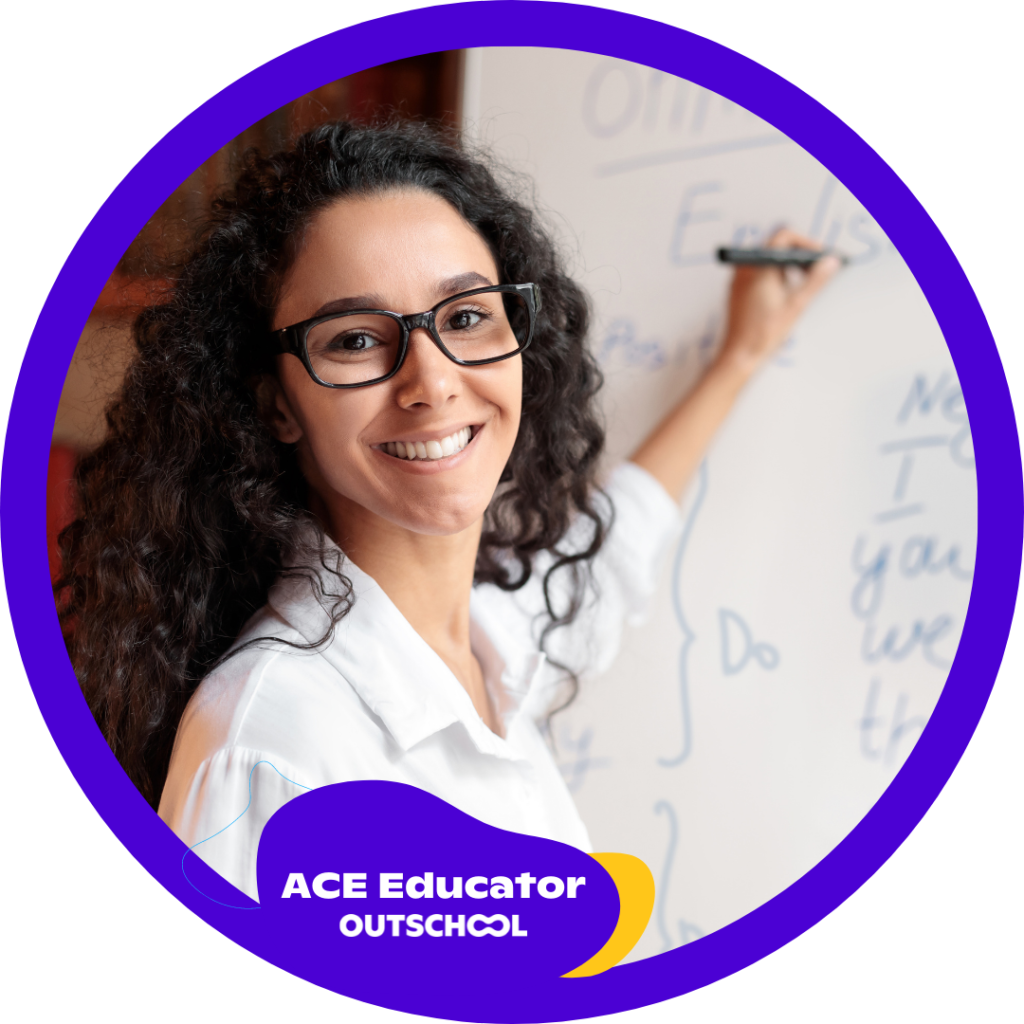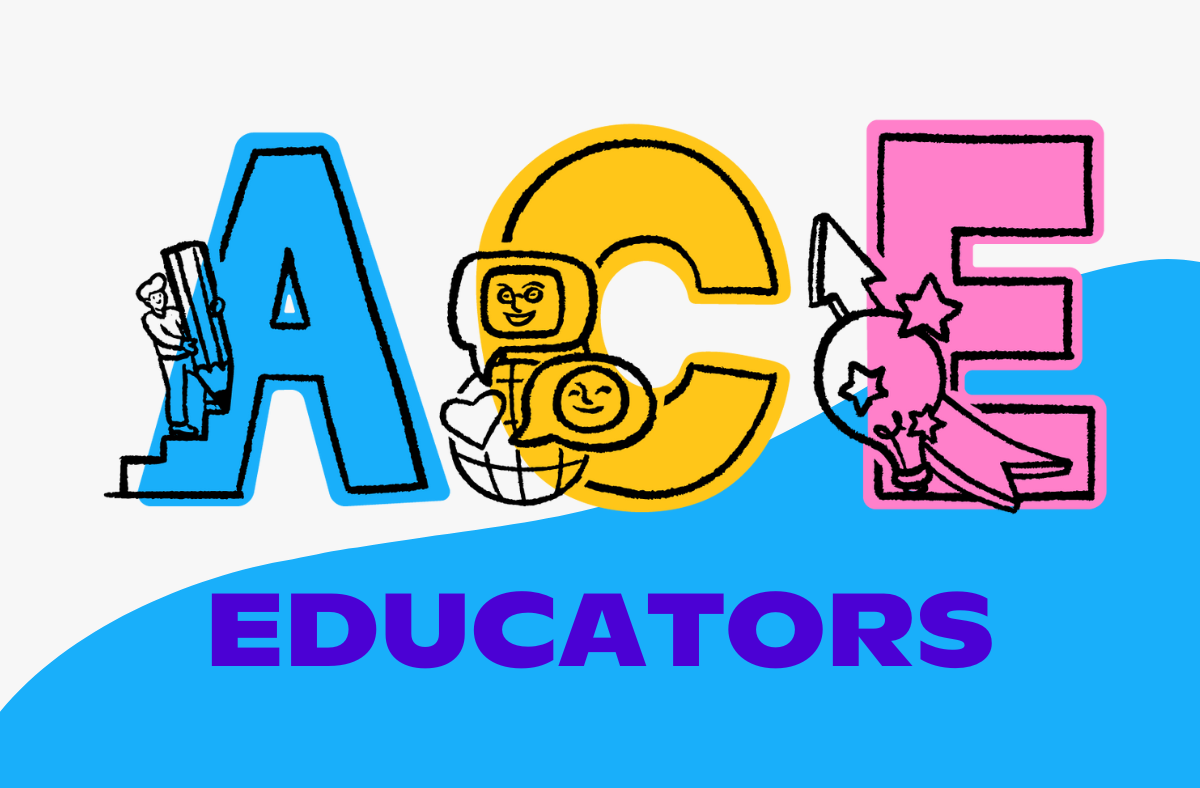Growing your teaching business is a full-time job. When you aren’t teaching, you’re creating content, requesting new classes, and responding to families… and that’s just the stuff you focus on within the Outschool platform.
Many teachers also say that they’re out there building their reputation, spreading the word about their classes in Outschool Facebook groups, and marketing their business online using marketing strategies suggested by long-time Outschool veterans.
Recently, Outschool created a learning pathway designed to equip all educators on Outschool with the skills to create inclusive, positive classroom experiences for learners. What does this mean for your business? Let’s take a look.
What is ACE?

ACE stands for Agency, Community, and Expertise: the 3 pillars of the ACE Teaching Framework. The ACE Framework is how Outschool defines outstanding learning experiences on our platform. Each pillar embodies the core attributes we encourage educators to practice and develop by participating in professional learning opportunities.
Opportunities to learn with the ACE Framework
For educators looking to expand their knowledge, Outschool has assembled a collection of optional learning opportunities covering each of the ACE Framework pillars. These include online courses, pre-recorded webinars, and live events.
This collection of learning opportunities has been curated by Outschool and will be frequently updated with new experiences, both live and asynchronous. Educators can also submit a wide variety of professional learning that they’ve completed within the last 8 years for consideration for ACE Educator certification.
Why you should become an ACE educator
Alice Campbell had this to say about why participating in the ACE program benefits educators and learners,
“It is the practice and discipline of continuing education which has allowed me to build the real bridge between ideas (and ideals!), and my day-to-day work with children…[including] dedicated time to support my own learning in workshops or courses. These formal experiences allow me to connect with, and be mentored by, many people who I would otherwise never have the opportunity to meet. These include expert practitioners, researchers, as well as people with lived experience who are sharing their wisdom in ways that have practical implications for how I respond to the needs of children and families.”
By committing to being lifelong learners and growing as teachers, all educators on Outschool have the chance to practice skills that help them create a learning environment that is relevant to today’s world; be prepared for the unexpected; spark new ideas in class; and remain open to new perspectives.

Defining agency
At Outschool, supporting learner agency means encouraging learners to take a leading role in class and set individual goals for their progress. Learners who actively direct their learning are more engaged and motivated to learn. They tap into their passions, problem-solve, use critical thinking skills, create, communicate, and develop a growth mindset where they can take on challenges and learn from them.
What educators can gain from implementing agency in their classroom
- Recognize diversity in learners and how they learn best
- Provide equitable access to learning by encouraging learner choice
- Support goal-setting and reflection during the learning process
- Implement learner-centered instructional strategies in class
How learners can benefit from educators who apply agency
- Learners are empowered to explore their interests and passions.
- Learners get to make choices about what they learn, how they learn, and how they demonstrate understanding.
- Learners know why they are in class and what they want to get out of their Outschool experience.
Don’t take our word for it. Check out what these educators have to say about learning opportunities in the agency pillar:
“I attended all the sessions of Elementary STEMCON and was so inspired to create classes. My Unplugged classes are a direct result of attending this conference. Every speaker provided a wealth of knowledge on how to empower learners to enjoy STEM. Many of the speakers spoke about inclusion and equity. I have incorporated student reflection into my classes based on ideas gained from the presenters. Most of all, I appreciated everyone’s enthusiasm.”
– Sara Moore
“I enjoyed the deep dive into the research behind learning differences and the insight it provides into my student’s experience.”
– Julie Alvarez
How educators are applying agency on Outschool
“I can look for opportunities to make more of my classes learner-led. For example, when doing a painting, have them say more of what they want to put into their paintings. Also, I can be flexible when they have different materials than the ones that I have listed in the class. For example, when they have crayons instead of acrylic paints swapping my medium over to crayons along with them to show them how to create the dimension in their work.”
– Maria Thorne

Defining community
Outschool is a global platform, and educators should foster a strong sense of community by celebrating individuality and presenting multiple perspectives on class topics. We believe that educators should offer unbiased classes that are inclusive of all learners and intentionally designed to represent diverse viewpoints fairly and accurately. Doing so ensures that all educators, learners, and families feel welcome on our platform and have a positive experience in their Outschool classroom.
Cindy Frank plans on using what she learned about community through an ACE Framework course to create stronger connections,
“All of my classes are small and interactive and discussion based. I want to keep asking my learners the big questions and allow their ideas to move the discussion forward.”
Jess Coulter shared her experience engaging in the ACE community pillar,
“I enjoyed the format and content of the [learning opportunity]. While I feel I am good at discerning the accuracy of information sources, this gave me some concrete things to share with others (my Outschool learners and my own kids) regarding how to spot disinformation, misinformation, and partial information. It also helped me to develop specific ideas for sharing these with classes.”
What educators can gain from creating a community in their classroom
- Recognize diversity and the unique qualities of every learner.
- Connect learners to people, resources, and activities that grow their love of learning.
- Maintain a global perspective and seek out diverse viewpoints on class topics.
- Ensure community participation is positive, professional, and uplifting.
How learners can benefit from educators who believe in fostering community
- Learners feel welcome, included, and like they belong there.
- Learners build meaningful relationships with both peers and educators.
- Learners are comfortable sharing their thoughts and ideas without fear of judgment or discrimination.
Explore community learning opportunities.

Defining expertise
At Outschool, our mission is to inspire a love of learning. The expertise pillar of the ACE Framework focuses on helping educators discover and practice teaching strategies that promote learner growth. By participating in learning opportunities centered on expertise, you can help learners strive toward mastery in all of their endeavors.
Shiren Van Couten found the skills taught in the expertise-focused learning opportunity she participated in particularly helpful when faced with challenges,
“I enjoyed brainstorming with other teams about the hands-on curriculum analysis and design activities we did in group, and also discussing the challenges that may be faced by learners and teaching staff, as well as hearing how professionals from other schools addressed these challenges, and offering my own solutions.”
What educators can gain from promoting expertise in their classroom
- Support learners at all stages of mastering a concept.
- Utilize differentiation strategies that enhance and improve learning experiences.
- Normalize mistakes and mastery while extending learning beyond the lesson.
- Implement inclusive classroom management techniques and strategies.
How learners can benefit from educators who focus on expertise
- Learners understand that making mistakes is an integral part of mastering a skill.
- Learners can try again when they fail.
- Learners take pride in their achievements and set new goals after accomplishing old ones.
How educators are applying expertise on Outschool
Maryam Awan is applying the learnings from her “Blended Learning” experience in the expertise pillar in this way,
“I firmly believe in letting learners research and work things out without someone coming to save them immediately. In class, I like to invite and encourage learners to help one another when tech issues arise while we troubleshoot together through questioning and exploration. With blended learning, I can take this a step further and plan to add blended learning as a skill we may practice as it arises to part of my class descriptions.”
Ready to learn more about community? Register today to get started with Outschool’s expertise pillar.
Whether you’re hoping to learn more about agency, community, or expertise, we want to encourage you to continue your education with Outschool’s professional learning opportunities.

